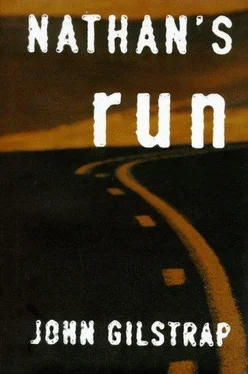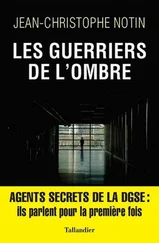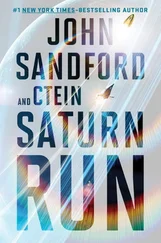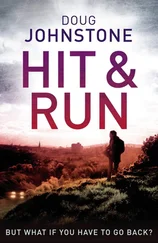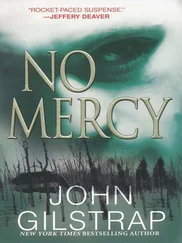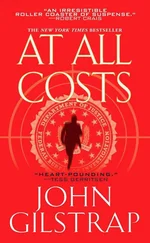John Gilstrap - Nathan’s Run
Здесь есть возможность читать онлайн «John Gilstrap - Nathan’s Run» весь текст электронной книги совершенно бесплатно (целиком полную версию без сокращений). В некоторых случаях можно слушать аудио, скачать через торрент в формате fb2 и присутствует краткое содержание. Город: New York, Год выпуска: 1997, ISBN: 1997, Издательство: Grand Central Publishing, Жанр: Триллер, на английском языке. Описание произведения, (предисловие) а так же отзывы посетителей доступны на портале библиотеки ЛибКат.
- Название:Nathan’s Run
- Автор:
- Издательство:Grand Central Publishing
- Жанр:
- Год:1997
- Город:New York
- ISBN:978-0446604680
- Рейтинг книги:3 / 5. Голосов: 1
-
Избранное:Добавить в избранное
- Отзывы:
-
Ваша оценка:
- 60
- 1
- 2
- 3
- 4
- 5
Nathan’s Run: краткое содержание, описание и аннотация
Предлагаем к чтению аннотацию, описание, краткое содержание или предисловие (зависит от того, что написал сам автор книги «Nathan’s Run»). Если вы не нашли необходимую информацию о книге — напишите в комментариях, мы постараемся отыскать её.
Nathan’s Run — читать онлайн бесплатно полную книгу (весь текст) целиком
Ниже представлен текст книги, разбитый по страницам. Система сохранения места последней прочитанной страницы, позволяет с удобством читать онлайн бесплатно книгу «Nathan’s Run», без необходимости каждый раз заново искать на чём Вы остановились. Поставьте закладку, и сможете в любой момент перейти на страницу, на которой закончили чтение.
Интервал:
Закладка:
Brian was Warren’s reason to stay young. He told everyone who would listen that the girls were important to him—and they absolutely were—but that it was his son who’d fulfilled the order he placed at the baby store.
On that day in October when Brian was stolen from their lives by a drunk teenager in a crush of twisted steel and aluminum, Warren’s personality changed. He went through all the motions of life, but something was gone, like a table lamp, perhaps, with a 25-watt bulb where a 60-watter belonged. At first he withdrew completely, grieving in silence while he made a great show of helping others cope.
Next came the anger. He attended both days of the teenager’s trial, arriving early to sit up front where he could stare at the defendant, and be clearly visible to the jury.
When the driver was convicted as an adult of voluntary manslaughter and sent to the state prison in Richmond, it was as though the anger had been exorcised from Warren’s soul. A spring returned to his walk, and he began to show an interest again in the family. He told Monique one night that justice had been done, and now he could begin to put this all behind him.
But he’d never be the same, and they both knew it.
The look in Warren’s eyes and his posture in the chair reminded Monique so much of the bad days following Brian’s death. She didn’t know how much more of this he could hold in until he just came apart. It would happen one day, she was sure, just as it had happened to her time and again in the therapist’s office. She wouldn’t force it. But she prayed she’d be there for him the day it happened.
“It’s just not fair,” he said after a very long time.
Together as a couple, yet alone with their thoughts, they sat in silence on the front porch for more than an hour, listening to the shrill chirping of a million night creatures as they screamed their battle cries and sang their love songs in the darkness. They had been through a lot together, most of it wonderful, some of it horrifying. But on balance, they’d grown closer through it all. In the deflected glow of the stars and the streetlight, Monique held Warren’s hand and secretly watched as tears balanced themselves on the edge of his eyelids and rolled down his stubbly cheeks. He said nothing, and he made no move to wipe them away.
As a knot formed in her own throat, Monique realized that she loved her clumsy, intolerant, macho, sexist husband more at that moment than she had on the day he proposed.
Chapter 17
By 4:15, Nathan was somewhere between Harrisburg and WilkesBarre, Pennsylvania, and looking for his next rest stop. In six hours of driving, he hadn’t gone nearly as far as he’d hoped. Distances on the map just looked shorter. The Beemer’s gas gauge was nudging empty when he pulled off the highway and headed toward what appeared to be a residential area.
This driving stuff had turned out to be less exciting than he’d expected. Once past the roadblock near his ex-home, he’d blasted straight through Virginia and Maryland without incident. His biggest problem turned out to be cramping in his right leg from keeping his toe pointed all the time to reach the gas pedal. Sitting in one spot for so long, without the option of moving his butt more than a half-inch at a time, had begun to take its toll on him as well. He was hungry. And thirsty. And he had to piss so bad he thought he’d explode.
The exit ramp off of Route 81 dumped him out onto another four-lane strip, this one criss-crossed with traffic lights all blinking yellow in perfect unison. He was in a low-rent business district, surrounded by darkened grocery and hardware stores, fast food places and a dollar movie theatre showing year-old movies for a third of what you could rent them for at the video store. Directly across the street was a competing marquee advertising triple-X-rated movies twenty-four hours a day. Sure enough, there were a dozen cars in the parking lot.
Though the Beemer’s need for gas and Nathan’s need for relief were becoming critical at the same time, he decided to press on further down the road. Maybe he’d become spoiled the night before, but this wasn’t the kind of neighborhood he wanted to move into—even as a burglar. A sign on a telephone pole told him that Little Rocky Creek was selling single-family homes from the low $180s just eight miles down the road.
“Little Rocky Creek it is,” he announced to the car.
It was a new housing development, still largely under construction. The house designs appeared similar to the neighborhood where he grew up, but they were much smaller, and so close together that from a distance some looked like they were actually touching their next-door neighbor. The main drag through the development, predictably enough, was Little Rocky Trail, which fed ten cul-de-sacs, around which most of the houses were situated. He began his tour of the neighborhood by cruising each of these side streets.
Everyone in the whole damned neighborhood received a morning paper, many of them two. How was he going to pick out the house on vacation if every driveway had newspapers on it? It was just one more thing he hadn’t planned for. He was scared to think about how many other things could go wrong that he hadn’t even considered. And whoever heard of a paper boy who had his route taken care of before five? When he was a paper boy a hundred years ago, he was lucky to get the Washington Post on his customers’ doorsteps before six, and even then it was because his father had wrestled him out of bed.
“Stay cool,” he told himself. “You’ll think of something.”
He finished his first complete pass without finding a single house bereft of papers. But this was still the Fourth of July holiday, and he knew in his heart that at least half of the neighborhood had to be on vacation. All he had to do was figure out which half, and make sure he didn’t make a mistake.
Your real mistake was getting yourself into this in the first place, he thought. Not that it mattered.
At the end of the tenth cul-de-sac, he swung the turn and came to a stop against the curb. The Low Fuel light was burning a bright orange now on the dash. He needed to think things through. How would MacGyver handle this, he wondered.
The first thing he’d do is take a leak.
He switched off the Beemer’s headlights and, moving as quietly as he could, slipped out the driver’s-side door, leaving the car running, and darted up the lawn to the shadow cast by a dogwood sapling near the front corner of the house. He turned his back to the road, and began relieving himself onto what appeared to be some sort of spider plant. In the silence of the night, he might as well have opened up with a fire hose, but once he’d started, there was no stopping until it was done. Middle school scuttlebutt had it that if you made yourself stop peeing before you were empty, you’d rupture your balls. Yet another thing worse than getting caught.
As he finished up and tucked himself away, his attention was drawn to a collection of three spindled handbills that had been stuffed into the handle of the screen door.
I wonder.
By taking four steps out into the yard, he could see the front doors of the neighbors’ houses, and none of them had any handbills on their doors.
Nathan, you’re a genius, he congratulated himself. To confirm his suspicion, he tiptoed up to the garage door. By standing on the metal handles he could peer through the small-paned windows into the darkness of the garage. Just as he’d hoped, there was an open spot. Better yet, there was a second car still there—a Honda, it appeared. He pumped his fist in the air. Yes! he cheered silently.
After making a mental note of the house number—4120—he jogged back to the Beemer and drove away. The first order of business was to ditch the car. He remembered passing a church just before turning into the development that would suit the task perfectly. He paid special attention to street names and the looks of his surroundings as he exited Little Rocky Creek, hoping to simplify the task of finding his way when he returned on foot.
Читать дальшеИнтервал:
Закладка:
Похожие книги на «Nathan’s Run»
Представляем Вашему вниманию похожие книги на «Nathan’s Run» списком для выбора. Мы отобрали схожую по названию и смыслу литературу в надежде предоставить читателям больше вариантов отыскать новые, интересные, ещё непрочитанные произведения.
Обсуждение, отзывы о книге «Nathan’s Run» и просто собственные мнения читателей. Оставьте ваши комментарии, напишите, что Вы думаете о произведении, его смысле или главных героях. Укажите что конкретно понравилось, а что нет, и почему Вы так считаете.
